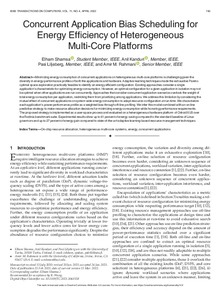Concurrent Application Bias Scheduling for Energy Efficiency of Heterogeneous Multi-Core platforms
Shamsa Elham; Kanduri Anil; Liljeberg Pasi; Rahmani Amir M.
https://urn.fi/URN:NBN:fi-fe2021042822137
Tiivistelmä
Minimizing energy consumption of concurrent applications on
heterogeneous multi-core platforms is challenging given the diversity in
energy-performance profiles of both the applications and hardware.
Adaptive learning techniques made the exhaustive Pareto-optimal space
exploration practically feasible to identify an energy-efficient
configuration. The existing approaches consider a single application's
characteristic for optimizing energy consumption. However, an optimal
configuration for a given single application may not be optimal when a
new application arrives. Although some related works do consider
concurrent applications scenarios, these approaches overlook the weight
of total energy consumption per application, restricting those from
prioritizing among applications. We address this limitation by
considering the mutual effect of concurrent applications on system-wide
energy consumption to adapt resource configuration at run-time. We
characterize each application's power-performance profile as a weighted
bias through off-line profiling. We infer this model combined with an
on-line predictive strategy to make resource allocation decisions for
minimizing energy consumption while honoring performance requirements.
The proposed strategy is implemented as a user-space process and
evaluated on a heterogeneous hardware platform of Odroid XU3 over the
Rodinia benchmark suite. Experimental results show up to 61% of energy
saving compared to the standard baseline of Linux governors and up to
27% of energy gain compared to state-of-the-art adaptive learning-based
resource management techniques.
Kokoelmat
- Rinnakkaistallenteet [29337]
